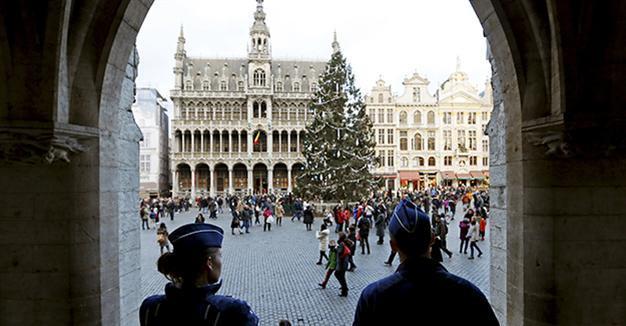Brussels cancels New Year's fireworks, festivities over terror threat
BRUSSELS - Agence France-Presse

Belgian police officers stand guard on Brussels' Grand Place, December 29, 2015, after two people were arrested in Belgium on Sunday and Monday, both suspected of plotting an attack in Brussels on New Year's Eve, federal prosecutors said. REUTERS/Francois Lenoir
Belgian authorities on Dec. 30 cancelled the annual New Year's Eve festivities and fireworks in the heart of Brussels after revealing an alleged jihadist plot to attack the capital during the holiday.
The city of 1.2 million people has been on high alert since France said several men involved in the deadly November 13 attacks in Paris had links to Brussels, which is home to the headquarters of the European Union and NATO.
"Unfortunately we have been forced to cancel the fireworks and all that was planned for tomorrow [Dec. 31] evening," mayor Yvan Mayeur told Belgian broadcaster RTBF.
Last year, some 100,000 people turned out to watch the traditional New Year's Eve fireworks display at the Place de Brouckere, a central square.
Mayeur said in the current circumstances it wasn't possible to "guarantee that we can check everyone coming to the event."
"It's better not to take any risks," he added.
On Dec. 29, the authorities said they had arrested two people suspected of plotting attacks on "emblematic sites" in Brussels during the New Year festivities.
A source close to the investigation told AFP officials were trying to determine whether members of a motorcyle gang, the so-called "Kamikaze Riders", were involved in the plot.
Belgian media said the gang's founder was one of the two held on suspicion of terrorism-related activities. The pair are due to appear before a judge on Dec. 31 who will determine whether or not to keep them in custody.
Speaking for the first time since the plot Belgian Prime Minister Charles Michel said the decision to cancel the New Year's festivities was a tough one but the right one.
"It was, I understand well, a delicate, difficult decision for the mayor to take," Michel told RTBF television.
It is not however the first time that the New Year's Eve fireworks have been cancelled as the authorities made the same decision in 2007 in connection with another terror threat.
"It's better to be safe than sorry," Georges, a Belgian of Greek origin told AFP as he sat with friends at a bar in Ixelles, just outside the city centre.
Since the Paris attacks and its links to Brussels, the friends said they had been avoiding crowded areas, including the central Grand Place, which Belgian media said may have been a target in the latest plot.
Alexandre, a Frenchman who moved to Brussels just weeks ago, told AFP he had been planning to attend the fireworks with his brother and some friends.
"It's a bit disappointing," said the 28-year-old, but he insisted it should not be seen as a win for the jihadists.
"We see it more as an act of prevention rather than a victory," he added.
Officials said the plot disclosed on Dec. 29 was not directly linked to last month's Paris attacks that left 130 dead.
A key suspect in those attacks, Belgian-born fugitive Salah Abdeslam, is believed to have fled to Brussels in the hours after the gun and suicide bombing attacks claimed by the Islamic State of Iraq and the Levant (ISIL) jihadist group.
Earlier on Dec. 30, Belgian police held a man for questioning following a new search in the troubled Brussels neighbourhood of Molenbeek in connection with the Paris attacks.
The French capital also remains on high alert and has abandoned its fireworks display on the Champs-Elysees, although the traditional gathering on the famous boulevard will go ahead under tight security.
